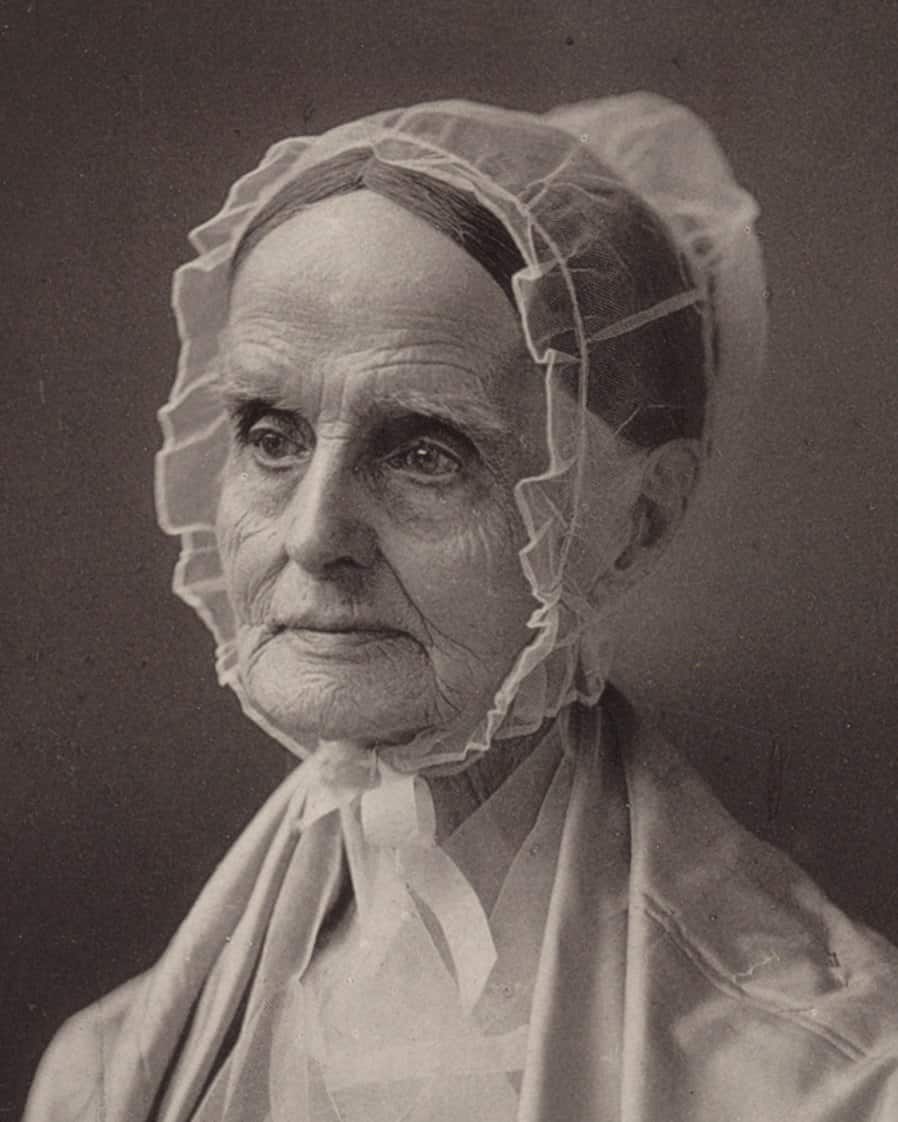 (1793-1880)
(1793-1880)
Though she stood barely 5 feet tall and never weighed more than 100 pounds, Lucretia Coffin Mott was and remains today a giant in the fight for equality—a founder of the women’s rights movement and one of America’s leading abolitionists.
Lucretia was the daughter of a Quaker whaling captain and spent her early years on Nantucket Island. The family moved to Boston in 1803 when her father decided to exchange the hazards of the sea for a merchant’s life.
Lucretia showed early signs of a quick mind, and when she turned 13 her parents decided she should attend a Quaker boarding school in New York. After completing her course work, 16-year-old Lucretia was asked to stay on as a teaching assistant and in that capacity came to know fellow teacher James Mott. As they spent long hours talking, she found him sympathetic to some of her early “radicalism.” The two were married in 1811 and moved to Philadelphia, where her family had relocated two years earlier, and James Mott joined his father-in-law in business. Lucretia gave birth to a daughter in 1812, and a son came along two years later.
After her father’s untimely death in 1815, both the Coffin and Mott families were left with heavy debts. James Mott decided to become a cotton merchant, a business he had learned from his uncle, but this did not sit well with Lucretia. As a girl she had read accounts of the slave trade, and she urged her husband to cease dealing in anything created with slave labor. Mott, who himself had abolitionist leanings, took little convincing and began to deal exclusively in wool.
In 1817 the Motts’ young son succumbed to typhoid fever. Lucretia’s grief led to a period of deep spiritual introspection, and she emerged with renewed devotion to her faith and to social issues. She began speaking frequently and eloquently in meeting, often exhorting others to join her and her husband in boycotting slave-created goods. In 1821 she was formally recognized as a Quaker minister and in this role became acquainted with many prominent abolitionists.
Mott began to travel extensively throughout the East and Midwest. Her preaching focused increasingly on anti-slavery issues, for which she drew criticism from Quaker elders who preferred that she avoid such divisive social issues. In 1833 Mott caused a stir by rising to speak at the National Anti-Slavery Convention in Philadelphia. (Unlike Quakers, the population at large—even a segment that advocated human rights for slaves—did not consider females equal.) She responded by forming the Philadelphia Female Anti-Slavery Society and helped draft its constitution.
“I have no idea of submitting tamely to injustice inflicted either on me or on the slave. I will oppose it with all the moral powers with which I am endowed. I am no advocate of passivity.”
~ Lucretia Coffin Mott
Women’s rights were added to Mott’s reform agenda when she attended the International Anti-Slavery Convention in London in 1840 and was placed in a roped-off area, hidden from the males in attendance, simply because she was a woman. This did not stop Mott from rising to speak, which drew the attention of the young Elizabeth Cady Stanton, who was also attending the convention. The two women bonded and resolved to hold their own convention to further the rights of women.
During the next eight years Mott traveled widely, speaking vociferously against slavery and, increasingly, for women’s rights. In her Quaker dress and bonnet, the diminutive woman was always a surprise to audiences, who expected a female activist to be somehow more intimidating and eccentric.
A chance meeting in 1848, while Mott visited Seneca Falls, N.Y., where Elizabeth Cady Stanton now lived, led to the convention that the two women had planned back in London. It is now known simply as the “Meeting at Seneca Falls” and the beginning of the women’s rights movement. Held in July 1848, the two-day convention drew an astonishingly large attendance of 300. The women present drew up a resolution to secure the right to vote, an act of effrontery that drew derision from newspapers of the time. When asked by a journalist what women of her type were seeking, Mott replied with dignity, “She asks nothing as a favor, but as a right … She is seeking not to be governed by laws in the making of which she has no voice.”
When the Emancipation Proclamation of 1863 ended slavery, Mott expressed delight that the “consummation” of the abolitionist cause was attained in her time. However, when the 15th Amendment was passed seven years later, prohibiting the denial of voting rights on the basis of “race, color, or previous condition of servitude,” she could not resist pointing out that the Constitution still excluded half the population.
By 1878 Mott had long since ceded most of her leadership role to younger women, but she was able to walk unaided into the 30th anniversary convention of the Meeting at Seneca Falls. Greeted from the platform by Frederick Douglass, the 85-year-old received warm applause from her fellow “soldiers.”
Two years later, the frail activist received word that a resolution had been passed by the American Equal Rights Association paying tribute to “its venerable early leader and friend, Lucretia Mott, whose life in its rounded perfections as wife, mother, preacher, and reformer is the prophecy of the future of woman.” Mott died in her sleep on November 11, 1880, just days after receiving word of this homage.
~ Leslie Hammond


